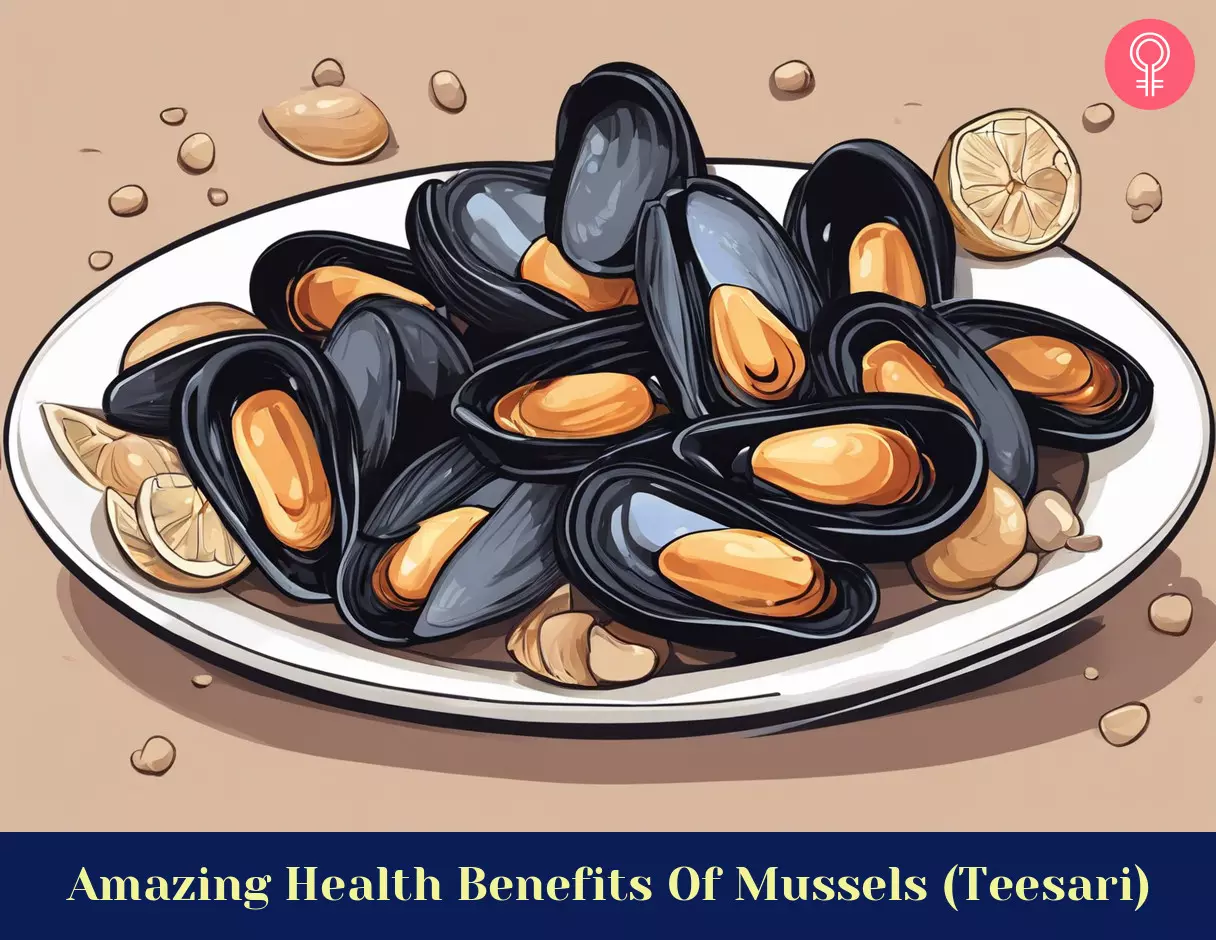Benefits Of Mussels: 19 Ways They Boost Your Health
The succulent shellfish is a precious gem for all the good it does to the body.

Image: shutterstock
Mussels have been eaten for thousands of years in coastal countries across the world for their numerous health benefits. High in omega 3 fatty acids and many essential nutrients, mussels are the perfect addition to your spicy seafood broth or pasta. About 17 species of mussels are edible and their benefits are well known. Significant scientific research has majorly been done on green lipped mussels to understand how they benefit humans. However, all mussels share a similar nutritional profile, and when consumed in moderation, can reflect similarly on human health. Plus, they are also environmentally friendly. They require minimal feed compared to other animal proteins, making them a sustainable choice for those mindful of their environmental impact. In this article, we explore the several ways mussels benefit you and a few tips to keep in mind before consuming them.
 Know Your Ingredient: Mussel
Know Your Ingredient: MusselWhat Is It?
An edible clam with a soft and gray inside and a black, gray, or blue shell found in salt and freshwater.
What Are Its Benefits?
It helps boost immunity, reduces joint pain, and slows down skin aging.
Who Can Consume It?
Anyone can consume them except people with a shellfish allergy, digestive disorder, and a weak immune system.
How Often?
You can eat up to two to three times a week.
Caution
Avoid eating mussels if you are pregnant or breastfeeding. Mussels that are not thoroughly cleaned may cause metal poisoning, diarrhea, and vomiting.

| Mussel | |
|---|---|
| A bed of blue mussels, Mytilusedulis, in the intertidal zone in Cornwall, England | |
| Scientific classification | |
| Kingdom: | Animalia |
| Phylum: | Mollusca |
| Class: | Bivalvia |
| Subclasses | |
| Pteriomorphia (marine mussels) Palaeoheterodonta (freshwater mussels) Heterodonta (zebra mussels) | |
In This Article
What Are Mussels?

Mussels belong to the family of clams and molluscs from saltwater and freshwater habitats. There are mostly two types of mussels – blue mussels and green lipped mussels. Unlike other edible clams, mussels have an elongated and asymmetrical shape. Most of them have shells that are generally rounded or oval. Their shells have subdued colors ranging in hues of blue, brown, gray and black while the interior is silvery. Their bodies are soft and spongy with a pale appearance and constitute the edible portion. They have a gritty and chewy taste.
There are different species of mussels that live either in freshwater or saltwater. They are mostly found in the shallow coastal areas of oceans or near the edges of ponds and lakes. Freshwater mussels are generally not eaten as they produce water pearls. Mussels can be eaten baked, smoked, fried, broiled and steamed and are a popular fast food item in European and Pacific countries. Mussels are mostly grown in farms for commercial use, but they may be harvested in the wild.
 Trivia
TriviaLet’s take a look at the types of mussels below.
Key Takeaways
- Mussels are found in saltwater and freshwater habitats, with blue and green lipped mussels being the most common.
- They help boost the immune system, increase blood circulation, and improve nerve function.
- Mussels may improve heart health and help manage joint pain and arthritis.
- They may reduce asthma, prevent eczema and psoriasis, and improve skin elasticity.
Types Of Mussels
Mussels are mainly categorized into two types – Marine mussels and freshwater mussels.
Marine Mussels
- Blue Mussel: A medium-sized edible marine mussel that is commonly harvested for food throughout the world.
- California Mussel: A large edible mussel native to the west coast of North America that is known for its elongated dark blue-black shells.
- New Zealand Greenshell Mussel: Native to New Zealand and known for its distinct green-colored shell.
Freshwater Mussels
- Pond Mussel: Native to North America and is found in lakes, rivers, and streams. It is a small freshwater species that helps in filtering harmful bacteria and algae.
- Eastern Elliptio Mussel: Found in Canada and the US. It filters sediments and nutrients from water and is a common food source for many species.
Now let’s find out the nutritional profile of mussels in the following section.
Mussels Nutrition Facts
Mussels can be cooked with or without shells and have been declared the best seafood by the Monterey Bay Aquarium as the method of farming them is environment-friendly. They are also a nutrient dense food. Their various health benefits can be attributed to their nutritional value given below. Their nutritional profile comprises vitamin A, B-vitamins like folate and B12, minerals like phosphorus, zinc and manganese as well as omega-3 fatty acids.
Here is the detailed information about nutritional benefits of mussels. Comparison Of Nutritional Values Of Blue Mussel, T-Bone Steak, Chicken And Turkey per 100gm (1), (2), (3), (4):
| NUTRIENTS | BLUE MUSSEL | T-BONE STEAK | CHICKEN | TURKEY |
| Calories | 172 kcal | 160 kcal | 285 kcal | 203 kcal |
| Protein | 23.8 g | 22.1 g | 26.9 g | 27.4 g |
| Fat | 4.48 g | 7.27 g | 18.9 g | 10.4 g |
| Carbohydrates | 7.39 g | 0 g | 0 g | 0 g |
| Cholesterol | 56 mg | 59 mg | 79 mg | 93 mg |
| Calcium | 33 mg | 21 mg | 13 mg | 28 mg |
| Magnesium | 37 mg | 11 mg | 20 mg | 30 mg |
| Phosphorous | 285 mg | 196 mg | 180 mg | 254 mg |
| Potassium | 268 mg | 263 mg | 182 mg | 294 mg |
| Iron | 6.72 mg | 1.65 mg | 1.37 mg | 1.52 mg |
| Fatty acids, total polyunsaturated | 1.21 g | 0.374 g | 4.23 g | 2.92 g |
This is chart is based on information provided by:
Calories And Fat
A 3 oz. serving of cooked blue mussels contains 146 calories, 4 grams fat, 6 grams carbohydrates, 48 mg cholesterol level, and 314 mg sodium. Since mussels are cooked in salt water, they contain a higher amount of sodium than other varieties of shellfish.
Protein
Mussels are a rich source of protein with a cup serving providing 18 grams of protein, which is equivalent to nearly 30% of the recommended daily value for an average adult. Dietary protein is an important source of amino acids required by your body to make proteins.
Vitamin A
These clams are also a good source of vitamin A. A cup serving of mussels contains 240 international units of vitamin A contributing to 10% and 8% of the recommended intake for women and men respectively.
Selenium
Mussels possess an abundant amount of selenium. A cup serving of mussels provides 67.2 micrograms selenium which is more than the recommended daily intake of 55 micrograms for adult men and women.
Vitamin B12
Mussels are an excellent source of vitamin B12. A 3 oz. serving of cooked mussel meat provides 20.4 micrograms that are equivalent to a whopping 340% of the recommended daily intake of this vitamin.
 Fun Fact
Fun FactNow that you have got to know what mussels are and what nutrients they contain, let’s go ahead and get to know of the amazing health benefits mussels can offer!
Top 19 Benefits Of Mussels
Are Mussels good for you? Check out some of the best Mussels benefits and decide for yourself!
1. May Promote A Healthy Heart

Being low in total and saturated fat but high in omega-3 fatty acids, mussels contribute to a healthy heart. According to research conducted by the American Heart Association, the omega-3 fatty acids, particularly those present in fish and shellfish, possess cardioprotective benefits. These heart-healthy unsaturated fatty acids lower the risk of developing abnormal heartbeats, as well as triglyceridei An ester, a prominent constituent of human and vertebrate body fats. It is derived from glycerol and three fatty acids. and fat levels in the bloodstream, thereby reducing the risk of heart attack or sudden death due to heart disease (5).
2. May Promote Treatment For Arthritis
According to research, the residents of the Maori coast of New Zealand whose diet consisted of green lipped mussels had lower incidences of arthritis. It has been found to be beneficial in the treatment of osteoarthritisi A common type of arthritis caused when the protective cartilage between joints deteriorates with time. and rheumatoid arthritis. Dried GLM extracts are particularly beneficial in this regard (6), (7).
3. May Aid Treatment For Joint Pains
Green mussels are a rich source of nutrients like iron, betaine and glycosaminoglycans like chondroitin sulfate. Some of these substances have been shown to contribute to relieving joint pains and joint stiffness (8), (9), (10).
4. Help Boost The Circulatory System
Regular intake of mussels may reduce the likelihood of heart attack and other circulatory problems. They facilitate healthy circulation to the vital organs and muscles by strengthening the arterial walls and improving blood flow (11).
5. Bone And Teeth Health
Mussels may improve bone health. Consumption of mussels may facilitate the structural strengthening of teeth and bones and provide necessary support to surrounding tissues owing to its mineral rich profile. However, there is a lack of studies to substantiate this health benefit.
6. Improve Immune System Health

Regular consumption of mussels may help improve your resistance to viral and bacterial infection. Studies have shown that green lipped mussels can improve wound healing by intensifying and accelerating the formation of antibodies (12), (13).
7. Promote A Healthy Nervous System
By stimulating the muscles, tissues and organs, green lipped mussels may help improve nerve cell functioning throughout the body and have a positive effect on cognitive brain functions (14). However, more scientific research is needed for evidence supporting the impact of mussels on the nervous system.
8. May Improve Fertility
Green lipped mussels are believed to benefit fertility by increasing the viscosity of cervical mucus plug in women and seminal fluid in men. However, there is a lack of scientific evidence to support this claim.
9. May Help Prevent Anemia
Green lipped mussels are an excellent source of iron with a 100 grams serving of cooked mussels contributing to over 100% of the recommended daily value for people above the age of 50. As we all know, iron plays a vital role in the production of red blood cells. It is involved in the formation of two oxygen carrying proteins namely hemoglobin and myoglobin. Deficiency of iron can lead to health issues like anemia, shortness of breath and low energy levels (1), (15).
10. May Aid In Weight Management

Fresh mussel meat contains the same amount of high-quality protein as red meat but has much less total fat, saturated fat and nearly 25% fewer calories. Thus, replacing red meat with mussel meat constitutes a low-calorie diet that provides benefits of weight management. Any seafood, especially mollusks, is beneficial for weight management. Just like mussels, the benefits of oysters, another mollusk, and popular seafood, also include boosting satiety and promoting weight loss.
11. May Reduce Symptoms Of Asthma
Green lipped mussels possess anti-inflammatory properties that have been found to be beneficial in reducing asthma symptoms. A study showed that patients who were given GLM extract experienced a significant decrease in daytime wheezing (16).
12. May Offer Skin Care Benefits
Seafood is beneficial for your skin as it has been shown to revive skin cells. Inflammation is one of the causes of skin aging. Green lipped mussels are rich in zinc and omega-3 fatty acids, both of which possess anti-inflammatory properties. Besides, deficiency of omega-3 fatty acids and zinc is considered to be one of the causes of psoriasisi A chronic skin condition characterized by scales and dry, itchy patches caused due to the build-up of skin cells. and eczema, both of which can be prevented by incorporating green lipped mussels in your diet. Supplements made from green-lipped mussels extract are considered to increase the elasticity of your skin, thus slowing down the aging process. However, there is a lack of evidence to draw definite conclusions about the efficacy of GLM extract for skin health (1), (17), (18), (19).
13. Promote Healthy Cellular Functions
As stated above, mussels are a rich source of healthy proteins. These proteins help in maintaining cellular functions by providing structural support to the cells, enabling metabolic reactions to generate energy and allowing cellular communication to make your cells work together.
14. May Offer Anti-Aging Benefits

Green lipped mussels contain mucopolysaccharides that can help slow down the effects of skin aging. Mucopolysaccharides are found in our hair, skin, and nails, and they are present in greater quantities when we are young to help us grow. They help to maintain the elasticity of skin and give a smooth complexion (20) .
15. Are A Great Source Of Protein
As we all know, protein is the building block of life. We all need adequate amounts of protein to grow. Green lipped mussels are a great source of protein. They supply almost 40% of the recommended dietary allowance of protein for men and 41% of that for women. Hence, they can be included in the diet of sports persons as they improve athletic performance.
16. Contain Iron
Consuming green mussels can help prevent anemia. Lack of iron in the body can lead to anemia. A single serving of green lipped mussels contain approximately 10.9 milligrams of iron. If you are over 50, then that takes care of your daily recommended intake of iron! Even people who are below 50, a serving of green mussels can give them around 50-60% RDA of iron. This iron helps the body to make hemoglobin and prevent anemia.
17. Are A Good Source Of Vitamin B12
A 100 gram serving of cooked green mussels contains around 20 milligrams of Vitamin B12, which is essential for pregnant women. Vitamin B12 helps in the production of red blood cells and DNA. It also helps your nervous system work properly.
18. Are Rich In Omega-3
Green mussel is rich in natural Omega-3 fatty acids. A human body cannot produce omega-3 fatty acid and needs to take it from other sources. Green Mussel is the best source of omega-3 and polyunsaturated fat. Omega-3 helps to prevent inflammation and reduce the risk of stroke, heart diseases, and arthritis. Omega-3 is also good for brain development.
19. Offer Other Benefits
Other benefits of eating mussels include protection of gastrointestinal tract, treatment of sports related injuries, muscle growth, scavenging free radicals, boosting immunity, giving healthy nails and aiding healthier nerve cell functioning.
So, this was about the best benefits of mussels, now know what are the precautions to follow before consuming it.
Precautions To Be Taken
Mussels are undoubtedly healthy seafood. This does not, however, undermine the need to exercise precaution in their preparation and consumption. Like other seafood, mussels are prone to bacterial contamination. Hence, only live mussels should be preferred, and dead mussels should be avoided as they deteriorate very quickly.
Dead mussels are slightly open and do not close when touched. Apart from this, poisonous algae often get accumulated on the mussels that build up in their tissues, rendering them unfit for consumption. Eating such mussels can cause paralytic shellfish poisoning. The amount of algae present in mussels is regulated and monitored by Government agencies. For safe consumption, it is advisable to soak the mussels in fresh water for 20 minutes to remove sand. Use a firm brush to remove the additional sand and other debris. Rinse them under cool tap water and wipe them with a towel before cooking. Mussels can be flavored with ingredients like shallots and garlic. Hence, careful preparation and health issues prevailing in fishing areas are extremely important to ensure the safety of both commercial and self-harvested mussels.
Infographic: Most Important Health Benefits Of Mussels
Mussels go well with seafood and can be baked, smoked, broiled, roasted, or steamed. They are rich in omega-3 fatty acids and other essential nutrients like vitamins A and B and minerals like zinc, manganese, and phosphorus. These nutrients make them a must-add to one’s diet. Check out the below infographic to learn more about the most important health benefits of mussels.
Some thing wrong with infographic shortcode. please verify shortcode syntaxThe benefits of mussels can be attributed to their rich nutritional profile and omega-3 fats. They may reduce the risk of heart attack, treat arthritis, improve blood flow, enhance bone and teeth health, and prevent anemia. In addition, they may slow down the aging process and increase skin elasticity. However, one should exercise caution while consuming them as they are prone to bacterial contamination. Soak them in fresh water to avoid any adverse effects.
Frequently Asked Questions
Can I eat mussels every day?
No. While mussels are a good source of nutrition, they also may contain mercury that could cause health problems. Hence, limit mussel intake to twice or thrice a week.
When should you eat mussels?
Mussels can be enjoyed as a lunch or dinner, preferably while fresh from the market (from September through April).
Black or green mussels: which variety is better?
It comes down to personal preference, as both types have a comparable nutritional profile.
How many mussels does one individual need?
One to one and a half pounds of mussels are adequate for one main course meal.
Are frozen mussels healthy?
Yes. Frozen mussels are as healthy as their fresh counterparts.
Illustration: Amazing Health Benefits Of Mussels (Teesari)

Image: Stable Diffusion/StyleCraze Design Team
Learn about the remarkable benefits of eating mussels. Check out this video to learn why they should be an integral part of your diet.
References
Articles on StyleCraze are backed by verified information from peer-reviewed and academic research papers, reputed organizations, research institutions, and medical associations to ensure accuracy and relevance. Read our editorial policy to learn more.
- Mollusks mussel blue cooked moist heat
https://fdc.nal.usda.gov/fdc-app.html#/food-details/174217/nutrients - Beef short loin t-bone steak bone-in separable lean only trimmed to 1/8” fat choice raw
https://fdc.nal.usda.gov/fdc-app.html#/food-details/168619/nutrients - Chicken stewing meat and skin cooked stewed
https://fdc.nal.usda.gov/fdc-app.html#/food-details/172401/nutrients - Turkey Ground cooked
https://fdc.nal.usda.gov/fdc-app.html#/food-details/171506/nutrients - Seafood Long-Chain n-3 Polyunsaturated Fatty Acids and Cardiovascular Disease: A Science Advisory From the American Heart Association
https://www.ahajournals.org/doi/10.1161/CIR.0000000000000574 - An Evidence-Based Systematic Review of Green-Lipped Mussel ( Perna canaliculus ) by the Natural Standard Research Collaboration
https://www.researchgate.net/publication/221902045_An_Evidence-Based_Systematic_Review_of_Green-Lipped_Mussel_Perna_canaliculus_by_the_Natural_Standard_Research_Collaboration - Green-lipped mussel (Perna canaliculus) extract efficacy in knee osteoarthritis and improvement in gastrointestinal dysfunction: a pilot study
https://pubmed.ncbi.nlm.nih.gov/22366869/ - Anti-inflammatory activity of chondroitin sulfate
https://pubmed.ncbi.nlm.nih.gov/18667340/ - Betaine in Inflammation: Mechanistic Aspects and Applications
https://www.ncbi.nlm.nih.gov/labs/pmc/articles/PMC5976740/ - A randomized double-blind placebo-controlled trial to investigate the effectiveness and safety of a novel green-lipped mussel extract -BioLex® -for managing pain in moderate to severe osteoarthritis of the hip and knee
https://www.ncbi.nlm.nih.gov/labs/pmc/articles/PMC5568208/ - Essential Fatty Acids as Biomedicines in Cardiac Health
https://www.ncbi.nlm.nih.gov/labs/pmc/articles/PMC8533423/ - Perna canaliculus and the Intestinal Microbiome
https://www.ncbi.nlm.nih.gov/pmc/articles/PMC5532649/ - Perna canaliculus (Green-Lipped Mussel) Bioactive Components and Therapeutic Evaluation for Chronic Health Conditions
https://pubmed.ncbi.nlm.nih.gov/26462365/ - A randomized controlled trial investigating the effects of PCSO-524® a patented oil extract of the New Zealand green lipped mussel (Perna canaliculus) on the behaviour mood cognition and neurophysiology of children and adolescents (aged 6–14 years) experiencing clinical and sub-clinical levels of hyperactivity and inattention study protocol ACTRN12610000978066
https://nutritionj.biomedcentral.com/articles/10.1186/1475-2891-12-100 - Iron Deficiency Anemia A Common and Curable Disease
https://www.ncbi.nlm.nih.gov/pmc/articles/PMC3685880/ - Treatment of asthma with lipid extract of New Zealand green-lipped mussel a randomised clinical trial
https://erj.ersjournals.com/content/20/3/596 - Discovering the link between nutrition and skin aging
https://www.ncbi.nlm.nih.gov/pmc/articles/PMC3583891/ - Study on the use of omega-3 fatty acids as a therapeutic supplement in treatment of psoriasis
https://pubmed.ncbi.nlm.nih.gov/21760742/ - Zinc and atopic dermatitis a systematic review and meta-analysis
https://pubmed.ncbi.nlm.nih.gov/30801794/ - The Effects of Mucopolysaccharide Polysulphate on Hydration and Elasticity of Human Skin
https://www.hindawi.com/journals/drp/2011/807906/
Read full bio of Gabrielle Kane
Read full bio of Tanya Choudhary
Read full bio of Ravi Teja Tadimalla
Read full bio of Moksha Gandhi
























Community Experiences
Join the conversation and become a part of our empowering community! Share your stories, experiences, and insights to connect with other beauty, lifestyle, and health enthusiasts.